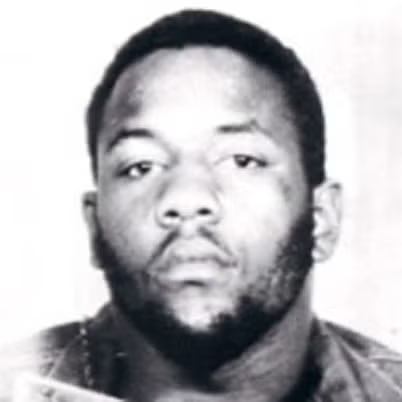
Table of Contents
Who Is Lorenzo Nichols?
Lorenzo Nichols was a prominent drug lord in New York City during the 1980s. He led an extensive network of drug operations in Queens, often employing close family members within his crew. Nichols’ criminal activities included numerous offenses, most notably the murders of his former parole officer and girlfriend. He is currently incarcerated in a New York State correctional facility, serving time for his crimes.
Early Years
Lorenzo “Fat Cat” Nichols was born on December 25, 1958, in Birmingham, Alabama. He rose to prominence in the 1980s as one of New York City’s leading drug lords. His nickname, as noted in Ethan Brown’s book Queens Reigns Supreme: Fat Cat, 50 Cent, and the Rise of Hip-Hop Culture, was derived from his imposing physical presence—characterized by a thick neck, a notably large head that obscured the faces of friends in photographs, and a distinctive beard.
Nichols spent his formative years in Alabama, raised primarily by his maternal grandmother. At approximately age 10, he relocated to Queens, New York, to live with his mother, Louisa, and her third husband.
Life of Crime
Nichols’s trajectory into a life of crime began when he dropped out of school before reaching the ninth grade, aligning himself with a dangerous crowd. He became a member of the Seven Crowns street gang and, in 1976, committed two robberies alongside another young accomplice. Convicted of both offenses, he received an 18-year sentence but was released after serving only two and a half years.
Following his release, Nichols transitioned into the more lucrative realm of drug dealing, establishing connections through Mafia affiliations that dominated the East Coast’s drug trade at the time. He built an extensive network of dealers, primarily operating in the streets and housing projects of southeast Queens. Notably, many associates in his operation were family members, including his mother and two sisters. Trusted associates included Brian “Glaze” Gibbs and Joseph “Mike Bones” Rogers, alongside Howard “Pappy” Mason, a former prison acquaintance. Nichols utilized Big Mac’s Deli, a business he and his wife, Joanne, acquired from her father, as the central hub for his illicit activities.
On July 29, 1985, Nichols was arrested during a police raid at Big Mac’s Deli, where authorities discovered two firearms, $180,000 in cash, and various narcotics, including heroin, cocaine, and marijuana. Although he secured bail after being charged with possession of drugs and firearms, he soon found himself back in custody for parole violations. Angered by his situation, Nichols ordered his associates to assault his parole officer, Brian Rooney. On October 10, Rooney was murdered, leading to Nichols’s indictment for second-degree murder in July 1987. During subsequent court proceedings, Nichols maintained that he had never intended for Rooney to be killed.
Even while incarcerated, Nichols continued to exert control over his drug operation and dealt ruthlessly with perceived betrayals. He later confessed to orchestrating the murders of two individuals. In 1986, his associates fatally shot Isaac Bolden, who had participated in a robbery against Nichols’s then-girlfriend, Karolyn Tyson.
Nichols’s former partner, Myrtle “Myesha” Horsham, also faced a grim fate after allegedly pilfering funds from his drug operation. Despite their shared parenthood of a son named T.C., Nichols ordered her execution in December 1987. Horsham, alongside a friend, was shot multiple times by Nichols’s crew; while the friend survived, Horsham succumbed to her injuries. At the time of the attack, T.C. was present and was later left at his maternal grandmother’s home.
Nichols stated that his motivation for Horsham’s murder stemmed from feelings of betrayal, claiming, “she was my girl and … she took my money and spent it on another person,” as reported in The New York Times.
As Nichols’s criminal enterprise unraveled, his own family became targets. In May 1987, his wife was kidnapped and held for ransom, although she was ultimately released after payment. Other family members were not as fortunate; in May 1988, a firebomb attack on the home of Louise Coleman, Nichols’s mother, resulted in the tragic death of his invalid half-sister, Mary, despite his mother and stepfather escaping unharmed.
At this juncture, Nichols had accrued multiple convictions for drug-related and weapons offenses, resulting in a 25-year-to-life sentence in January 1988. However, his legal challenges intensified following the cold-blooded murder of police officer Edward Byrne in February 1988, committed by his associate Mason, which sparked significant public outcry and increased scrutiny on Nichols’s operations.
Guilty Plea and Prison Sentence
In 1992, Nichols entered a guilty plea for charges related to the murder of Rooney, resulting in a sentence of 25 years to life in prison. Concurrently, he also pleaded guilty to federal drug-related charges and racketeering-related murder charges, receiving an additional sentence of 40 years, which was to be served concurrently with the state charges. Although Nichols could have faced a life sentence for the federal charges, he was granted a more lenient sentence in exchange for his cooperation with authorities. This decision was likely influenced by his desire to assist his mother and girlfriend, who were also facing charges related to their involvement in his drug operations.
Nichols is currently incarcerated in the New York State corrections system. In 2010, the New York Daily News published a letter from Nichols, in which he reflected on his past actions: “I have nothing but time to ponder my misdeeds,” he wrote, expressing, “To the victims of my criminal activities, I offer my deepest regret and sincerest apology.”
